
The Ichneumonidae, also known as ichneumon wasps, ichneumonid wasps, ichneumonids, or Darwin wasps, are a family of parasitoid wasps of the insect order Hymenoptera. They are one of the most diverse groups within the Hymenoptera with roughly 25,000 species described as of 2016. However, this likely represents less than a quarter of their true richness as reliable estimates are lacking, along with much of the most basic knowledge about their ecology, distribution, and evolution. It is estimated that there are more species in this family than there are species of birds and mammals combined. Ichneumonid wasps, with very few exceptions, attack the immature stages of holometabolous insects and spiders, eventually killing their hosts. They thus fulfill an important role as regulators of insect populations, both in natural and semi-natural systems, making them promising agents for biological control.

Cryptinae is a subfamily of wasps in the family Ichneumonidae. The family has also been called Gelinae, Hemitelinae, and Phygadeuontinae by various authorities, though the Phygadeuontinae have since been elevated to a separate subfamily.

Banchinae is a subfamily of ichneumonid parasitoid wasps containing about 1,500 species; the genera Glypta and Lissonota are very large. The three tribes are all distributed worldwide.
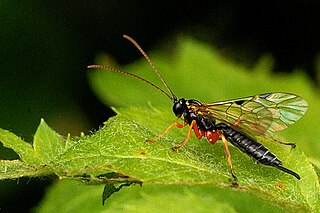
Pimplinae are a worldwide subfamily of the parasitic wasp family Ichneumonidae.
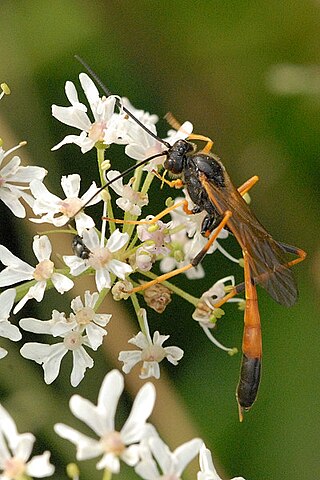
Anomaloninae is a subfamily of parasitoid wasps in the family Ichneumonidae. Several species provide beneficial services to humans by attacking forest or orchard pests.
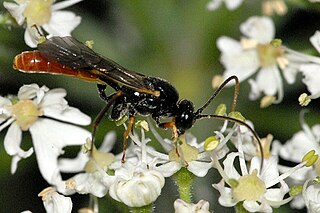
The Tryphoninae comprise a worldwide subfamily of the parasitic wasp family Ichneumonidae.

Eucerotinae is a worldwide subfamily of the parasitic wasp family Ichneumonidae with two genera, Euceros and Barronia.
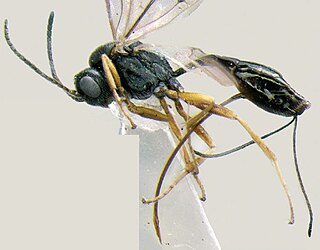
Tersilochinae is a worldwide subfamily of the parasitic wasp family Ichneumonidae.

The Labeninae is a subfamily within the parasitoid wasp family Ichneumonidae. The family is divided into 12 extant genera grouped within four tribes.

Lusius is a genus of parasitoid wasps in the tribe Phaeogenini Förster, 1869 or Alomyini Förster, 1869, first described by Pierre Jules Tosquinet in 1903, published after his death. The genus is similar in appearance to species in the genus Heterischnus. Lusius occurs in the Oriental, Afrotropical, Neotropical and Australasian biogeographical regions.

Aptesini is a tribe of ichneumon wasps in the family Ichneumonidae. There are 24 described genera.

Trogus is a genus of parasitoid wasp found in the Holarctic and Neotropic regions. It is placed in the subfamily Ichneumoninae and the tribe Ichneumonini. Trogus species are parasites of larvae and pupae of the swallowtail butterfly family, Papilionidae. The genus consists of twelve extant and one extinct species.
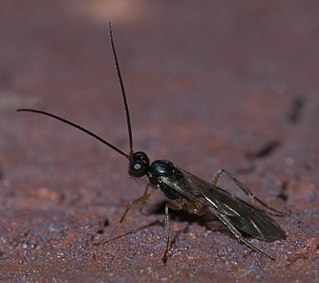
Phygadeuontini is a tribe of ichneumon wasps in the family Ichneumonidae. It is the only tribe in the subfamily Phygadeuontinae. There are about 123 genera in 12 subtribes worldwide.

Gravenhorstiini is a large tribe of parasitoid wasps belonging to the family Ichneumonidae It contains all the genera of the subfamily Anomaloninae, excepting Anomalon.
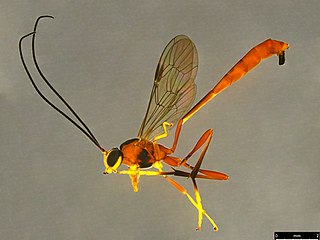
Habronyx is a genus of parasitoid wasps belonging to the family Ichneumonidae. The species of this genus are found in Europe, Australia, and North and South America.
Eurylabus is a genus of ichneumon wasps in the family Ichneumonidae. There are about 11 described species in Eurylabus.

Platylabini is a tribe of ichneumon wasps in the family Ichneumonidae. There are at least 40 genera and about 8 described species in Platylabini.

Listrodromus is a genus of ichneumon wasps belonging to the family Ichneumonidae. These wasps are parasitoids of butterflies of the family Lycaenidae, laying eggs in the caterpillars.

















